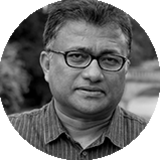Babu Thaliath

2023-2024
François Chevalier Fellow
Babu Thaliath is Professor of Philosophy and German Studies at Jawaharlal Nehru University, New Delhi since 2013. His research focuses on early modern philosophy of science and late medieval philosophia naturalis, the historical transition from medieval aporetics to early modern axiomatics, structural intuition (Martin Kemp), perception theory and aesthetics.
He studied civil engineering and German philology in India and did his doctoral studies and research in philosophy between 1997 and 2003 at the Albert-Ludwig-University Freiburg and the University of Basel. Subsequently, he completed several post-doctoral research projects in early modern mechanical philosophy at the Humboldt University of Berlin and the University of Cambridge (2005-2013). He has been Visiting Professor in the Department of History and Philosophy of Science and at St Edmund's College, University of Cambridge, Fellow of the International Kolleg Morphomata at the University of Cologne (2016) and Senior Fellow of the Zukunftskolleg, University of Konstanz (2021-2022).
His postdoctoral publications include the monographs Wissenschaft und Kontext in der frühen Neuzeit (2016), Die Verkörperung der Sinnlichkeit (2017) and Vom Aufspüren der Axiome. Die Epistemisch-Strukturelle Intuition und das moderne Wissenssystem (2021). His next publication (monograph) is Die Hinterlassenen Objekte. Das Bildmotiv in den Filmen Andrej Tarkowskis (2024).
Projet de recherche
Axiomatics is the most important foundation on which many modern sciences are built. Axioms are causally irreducible first principles which, as such, are considered apodictic or immediately certain and ultimately justified. They can therefore also tacitly go beyond the framework of fundamental research, which should in principle re-examine or problematise and extend the axiomatic foundations of the sciences.
The scientific primacy and immunity of axioms is clearly based on their formal rotundity and causal irreducibility, which, as is well known, was granted to early modern sciences such as Classical Mechanics through mathematical formalism. A renewed problematization of axiomatics, which should initiate and promote fundamental research in the field of axiomatic sciences, therefore requires a critical examination of the formal axiomatics of mathematics itself, in particular of geometry, on the basis of which early modern axiomatics (in the context of mechanics philosophy) could overcome once and for all the aporetics - or the incessant discourses on phenomenal aporias - long prevailing in medieval-scholastic natural philosophy.
His research is based on the basic assumption that the mathematical-formal axiomatics of early modernity was necessarily based on a structural intuitionism that brings back to light the theoretical, i.e. epistemological and ontological foundations of mathematical-formal axiomatics and its historically repressed problems or inadequacies.
Sélection de publications
- 2022. "La extensión corporal y extra-corporal de los sentidos", in: Sophia. Colección de Filosofía de la Educación, Universidad Politécnica Salesiana Ecuador, Núm. 33, pp. 113-141. DOI: https://doi.org/10.17163/soph.n33.2022.04.
- 2019. "Lenguaje y referencia", in: Sophia. Colección de Filosofía de la Educación, Universidad Politécnica Salesiana Ecuador, Núm. 27, pp. 141-146. doi.org/10.17163/soph.n27.2019.04.
- 2021.Vom Aufspüren der Axiome. Die Epistemisch-Strukturelle Intuition und das moderne Wissenssystem, Verlag Karl Alber, Freiburg / Munich.
- 2020. "Scientism of early modern age and the prevailing scholastic discourse on principium individuationis", in: Science and Scientification in South Asia and Europe, eds. Christoph Wulf & Axel Michaels, Routledge, New York. pp. 173-192.
- 2016. Wissenschaft und Kontext in der frühen Neuzeit, Verlag Karl Alber, Freiburg / Munich.






